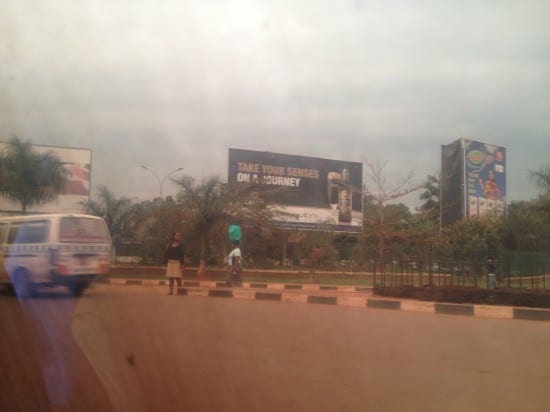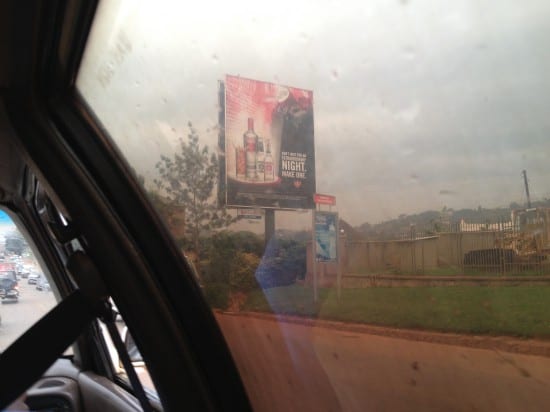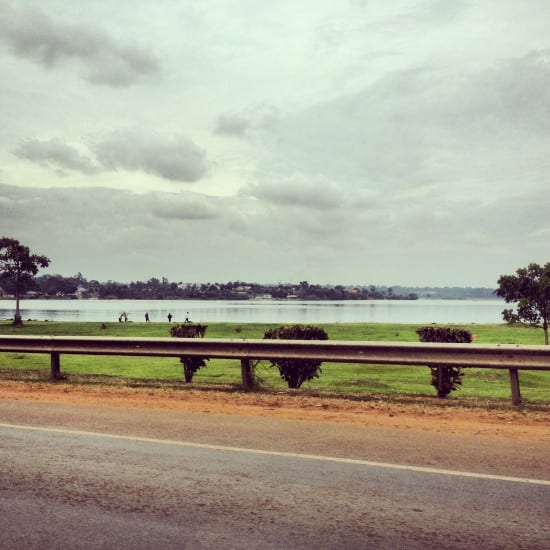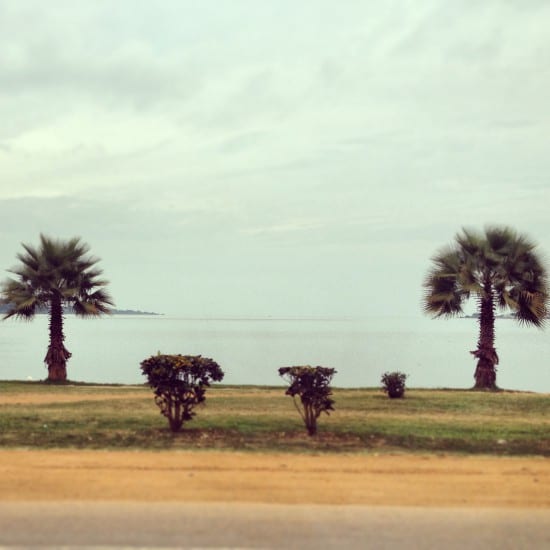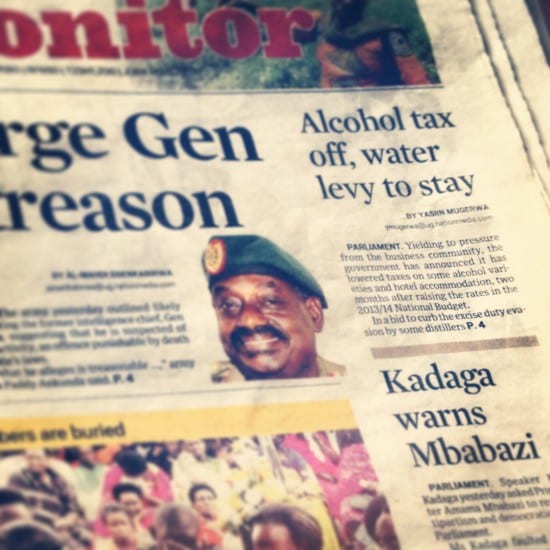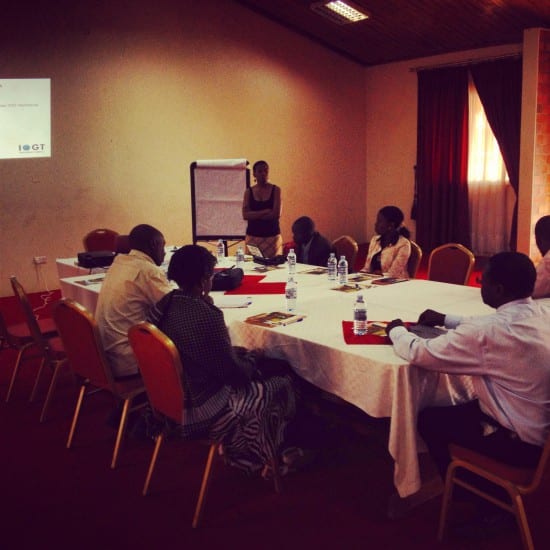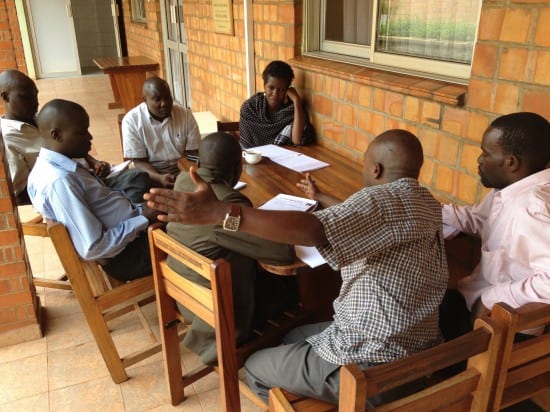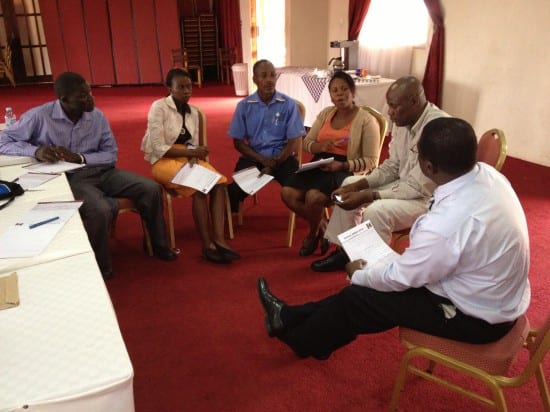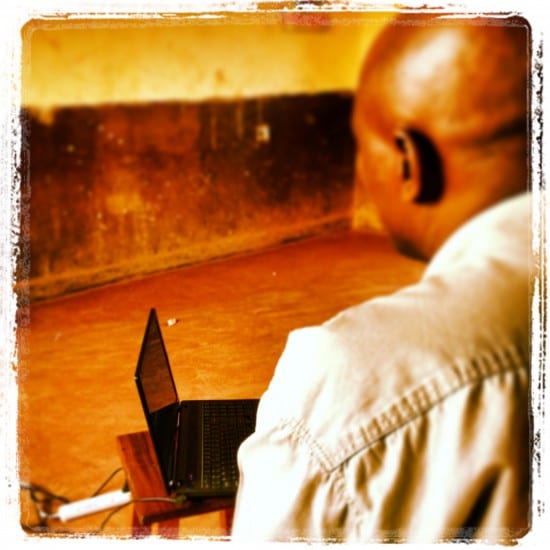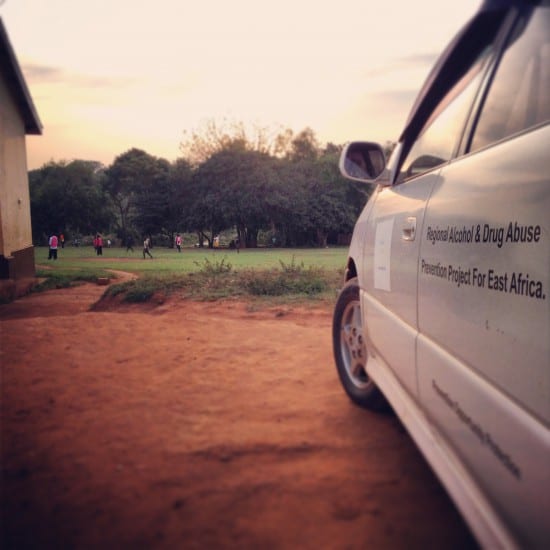I have travelled three countries in East Africa so far: Tanzania, Kenya and Uganda. And I am right now on the way to Burundi. All countries might have their significant differences but they have one huge similarity: their people are targets of the global alcohol industry.
That means being here in East Africa, I’ve had plenty of opportunity and plenty of time to contemplate alcohol marketing. There are giant billboards dominating the sides of the roads, airports, malls, squares.
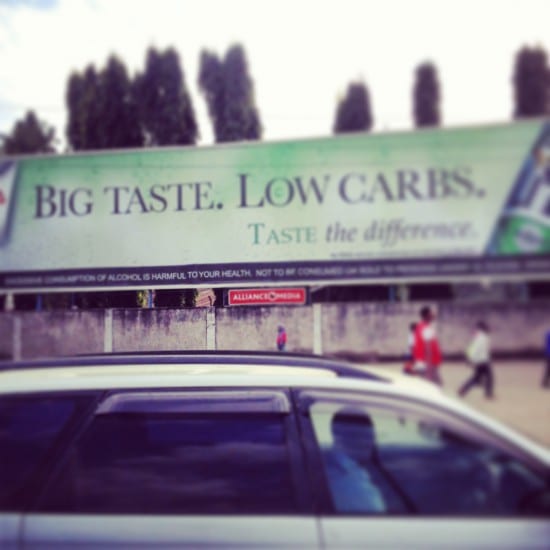
In East Africa the notorious traffic jams and Big Alcohol seem to cooperate: long exposure to omnipresent alcohol marketing
Stuck in one of the notorious traffic jams in Dar Es Salaam, I had time to read everything on this billboard. It was really huge. The billboard also talked about “Please drink responsibly.” And it also said: “Excessive consumption of alcohol is harmful to your health.”
What does responsible really mean? Authoritative dictionaries say: “answerable or accountable, as for something within one’s power or control;” and “having a capacity for moral decisions and therefore accountable; capable of rational thought or action.”
All billboards I have seen so far here during my travels portray these sentences of caution and responsibility, often accompanied by an age restriction for consumption.
This billboard that promotes some magical journey for the consumers senses obviously deflates any of the meanings of “responsible”. It makes alcohol use not a decision on moral grounds but on sensual grounds. To make a responsible decision a person needs to consider someone else than him/ herself but all alcohol marketing does it cater to the ego, to the gains the individual gains from using alcohol.
“Don’t wait for an extraordinary night. Make one.” To whom should someone who follows this encouragement be accountable – to the magical experience or to someone else, or to his own health? Research shows that people choose all the positive things they believe they get from using alcohol (powered by alcohol marketing) and they ignore anything they know about alcohol harms (if they know about all health harm and social harm).
So, the responsibility messages are a sad joke, one more way for Big Alcohol to mislead.
To my mind it seems increasingly that a good indicator for how far behind a country, a society is in terms of development and advancement of civilisation is alcohol marketing: to what extent and how is a society exposing and subjecting its people to alcohol marketing. The more marketing, the further behind the development towards a society that promotes well-being, health, prosperity. The bigger the billboards in public spaces, swarming the roads and schools, the further behind is the society.
My thoughts about alcohol marketing are finally related to these two newspaper articles: one from the New York Times and the other one from Time Magazine. The NYT writes about the five beer brands that are most often implicated in emergency room visits. This article covers the health harm caused by alcohol, by shiny brands and their marketing. Time Magazine covers another dimension of alcohol harm: the social, developmental and economic harm caused by Big Alcohol. The global alcohol industry is ruthlessly pursuing new markets in Africa driving people here into addiction, families into bankruptcy, communities into apathy and economies into the perils of loss of productivity and looming NCDs epidemic.
So, this is the background, or one of the aspects in the background for the tremendous need for effective, heart-driven advocacy by civil society for alcohol regulations in East Africa. And I am here to build capacities for that. As you can see it’s high time to get started and so we, Brenda and me set out…
Another miracle of nature I experienced on the trip to Kampala from Entebbe:
I was happy to have been able to make these shots, negotiating and avoiding the disturbing alcohol billboards.
Nobody likes to be lied to, to be exposed to situations of deliberate deception and manipulation. There’s absolutely none who enjoys or likes to be subjected to blunt lies. I don’t know anybody. And so I wonder and ask: why do we continue to tolerate alcohol marketing? Why do governments in East Africa continue to tolerate these practices of the global alcohol industry?
As I am asking this question and discussing it during and after the workshop in Kampala with heart-driven activists, we come across the latest news on alcohol policy in Uganda (August 21, 2013). There’s a lot for us to do and no time to waste in our advocacy efforts.
Therefore we held our first workshop with the Uganda Alcohol Policy Alliance (UAPA) in Kampala to come up together with a specific advocacy strategy for the coming three-year period.
I had fourteen participants from several different organizations that together form UAPA. We worked intensely and devotedly in a day long session and some of the highlights of the discussions were:
– outlining the values that drive UAPA and that are the foundation for the political work and the issues UAPA will advocate for; this was an inspiring session because it showed to me how heart-driven every single one of the participants is and some of the reasons why they invest so much time and effort in protecting especially children and young people from alcohol harm.
– a discussion about the advocacy map in Uganda that touched upon the tactics of Big Alcohol and raised the question what it is we as civil society movement have to succeed; In my answer I talked about timing, know-how and a little luck. Know-how is about having the evidence and making sure it reaches the right decision-maker at the right time (which is timing); but know-how is also bigger than that: it’s about being able to tell stories that numbers cannot tell, the stories of children of alcoholics for example or of women who fell victim to alcohol violence. And know-how is about using our credibility and heart-driven efforts as counter-weight against Big Alcohol’s big bucks and profit hunger.
– the session on specifying the political demands and going into detail of who is responsible for what was really exciting because we challenged each other, our arguments and our knowledge about alcohol policy; this was great fun and very useful for future advocacy.
In the end of this intense and gratifying day I even had the chance to go and see the work UYDEL does, especially their sober group. It also gave me an opportunity to see more of Kampala. UYDEL is impressive and I loved to play some football with the kids there and I got inspired by a song the Sober Group had written and produced. I hope I can soon share it with you.
